Next-Gen Entrepreneurs - Part 2
Published September 17, 2025
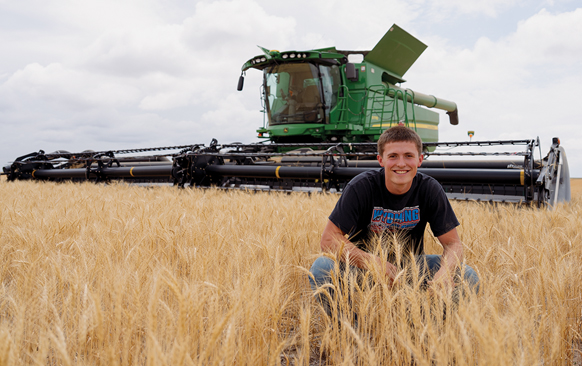
Stuart Lerwick harvesting wheat on his family’s farm
For 25 years, the John P. Ellbogen $50K Entrepreneurship Competition has encouraged and rewarded the next generation of entrepreneurs.
Read about the competition here.
By Micaela Myers
Cowboy Country Milling
This year, Cowboy Country Milling took home the first place and First Interstate Audience
Choice awards. The team is made up of College of Business students Stuart Lerwick
of Pine Bluffs, Emily Jarrell of Sanford, Fla., and College of Law student J.D. Corson
of Baggs.
“The idea came from the roots of a fifth-generation family farm in Albin, Wyo.,” says
Lerwick, the team’s leader. “I was concerned with the lack of Wyoming representation
in the flour industry and wanted to change that. This turned into understanding the
process of how flour is made and realizing how over-processed and chemically treated
wheat is through the process of milling.”
Cowboy Country Milling brings Wyoming-grown wheat to bakers, offering flours crafted
to meet the needs of artisanal and home baking. Using traditional milling techniques
and a variety of wheat types, the company aims to celebrate Wyoming’s agricultural
heritage while providing high-quality products.
“Through the competition, we’ve gained lots of experience with preparing for meetings
and pitches, along with invaluable lessons and feedback from those who know best,”
Jarrell says. “Experiential learning is arguably the best way to gain knowledge, and
this competition really taught us that. The people we’ve met along the way continue
to positively impact us as people and business owners.”
Corson adds, “Expect to have flour on your table soon!”
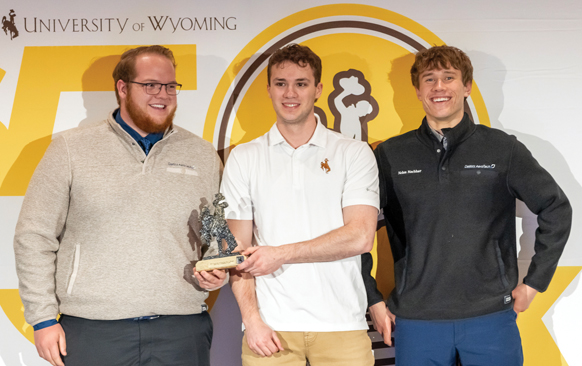
Korbin DeWitt, Nile Young and Nolan Nachbar (Photo by J.T. Cattelan)
DeWitt AeroTech Inc.
DeWitt AeroTech Inc. specializes in advanced drone technology for industrial inspections
and earned this year’s honorable mention and third-place awards. The company is led
by College of Business student Korbin DeWitt of Shoshoni and College of Engineering
and Physical Sciences students Nolan Nachbar of Evansville and Nile Young of Laramie.
DeWitt serves the energy, infrastructure and agricultural sectors. The company enhances
safety and efficiency through its cutting-edge micro-drone, the MicroScout. Compact,
modular and highly adaptable, the MicroScout is designed to access tight spaces and
gather critical data with precision.
“MicroScout was born out of countless conversations with our friends and family —
many of whom work in emergency response such as firefighters, EMTs, law enforcement
officers, and search and rescue professionals,” DeWitt says. “These are people we’re
close to, and they kept telling us the same thing: They need something small, fast
and simple that gives them intel before they enter dangerous or unknown environments.
That’s what drove us to build MicroScout.”
The Ellbogen Entrepreneurship Competition gave the team pitch experience and helped
it communicate the value of MicroScout more clearly in a high-pressure setting. The
team plans to continue development, testing and refinement of the platform as it prepares
for early field deployment.
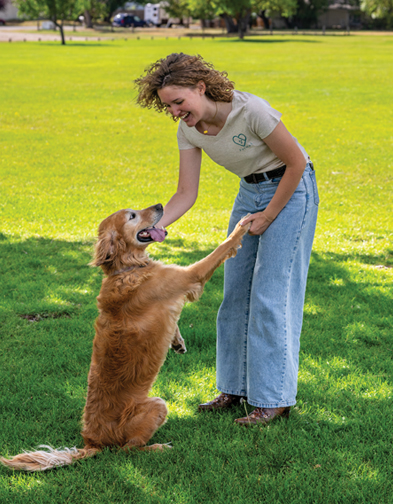
Josephine Walton
PetNet
PetNet is developing an all-in-one platform for pet owners, integrating social networking, expert advice and a curated marketplace. The app will allow users to create pet profiles to track health records, milestones and care preferences and will connect owners with veterinarians, groomers and pet service providers.
“PetNet came from my love for animals and the chaos of trying to care for them in
today’s world,” says College of Agriculture, Life Sciences and Natural Resources student
Josephine Walton of Sheridan, who teamed up with College of Engineering and Physical
Sciences and Haub School of Environment and Natural Resources student Lilly McGever
of Phoenix, Ariz., and College of Business students Karsten and Keaton Stone of Cody.
“As a lifelong pet owner, I know how much a pet can change your life — coming home
to that wagging tail, that unconditional love,” Watson says. “I truly believe pets
make us better people — happier, more grounded and far more present. I wanted to build
something that supports that bond. That’s where PetNet began: a one-stop platform
where everything from pet profiles to a dedicated marketplace could come together.
More than just a tool, it’s a community rooted in passion, built with purpose and
designed to make pet care feel less overwhelming and more connected.”
The team is currently developing the app and reaching out to local small pet businesses.
“The Ellbogen competition was extremely transformative,” Watson says. “It gave my
team the structure, mentorship and opportunity to take our idea seriously and grow
our business. Being surrounded by so many passionate experienced professionals gave
us the inspiration to dream bigger and think deeper. My team walked away with an understanding
about what it takes to build a business and a plan to succeed. We are incredibly grateful
to have had the chance to compete throughout the Ellbogen competition.”
Prene Outdoors
Led by College of Business student John Beier of Sidney, Neb., Prene Outdoors is an
emerging waterfowl brand that produces high-quality apparel and gear for hunters.
The company’s product line includes field drinkware, dry bags and call lanyards, all
designed for durability in harsh outdoor conditions. While currently focused on waterfowl
hunting, Prene is exploring expansion into deer, turkey and upland bird markets. The
company took home the Daniels Fund Ethical Startup Award and the Micale Community
Award.
“The idea for Prene came from the desire to create gear and apparel that is specifically
designed and made for waterfowl hunters and to create a company that had a strong
community feel and not just another disconnected brand,” Beier says. “I gained tons
of knowledge from the Ellbogen competition, including speaking skills that I never
had before. I also gained business knowledge and access to incredibly smart mentors.”
Beier plans to double the product line within a year.
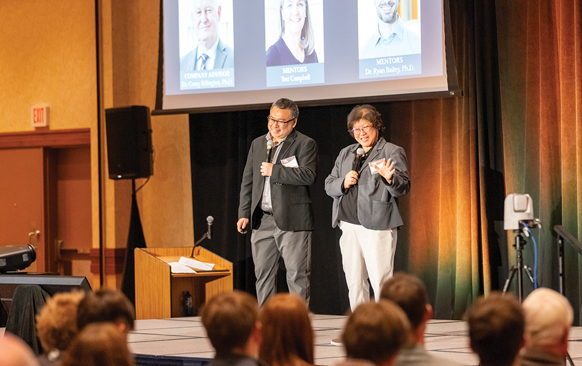
Kam Ng and Chooi Kim Lau (Photo by J.T. Cattelan)
Carbonado Technology LLC
This year’s runner-up, Carbonado Technology LLC, is pioneering coal-derived materials
to sustain Wyoming’s communities amid the state’s evolving energy landscape. The company
has developed 12 patented construction materials, including char bricks and stone
veneers. While breaking into the construction market requires significant investment,
Carbonado is currently focusing on small artisanal products with fewer regulatory
barriers.
It was founded on years of dedicated research and development by MBA student and Department
of Civil and Architectural Engineering Research Scientist Chooi Kim Lau and College
of Engineering and Physical Sciences Professor Kam Ng. Motivated by a shared mission
to repurpose Wyoming’s abundant coal resources in an environmentally responsible way,
they applied their engineering expertise to develop a process that transforms coal
byproducts into eco-friendly construction materials. These innovations are protected
under patents licensed through UW and are ready for commercialization.
The core innovation behind Carbonado originated from Lau’s master’s thesis, which
earned the UW 2024 Outstanding Master’s Thesis Award. Titled “Investigating the Lifecycle
and the Techno-Economic Analysis of Coal-Derived Carbon Building Materials for Low-Rise
Buildings,” it laid the technical and economic foundation for Carbonado’s mission.
Her work is a compelling example of how academic research can drive real-world innovation
and economic development in Wyoming and beyond.
“Our patented product line — developed in partnership with UW — includes bricks, stone
veneers, block pavers, aggregates, mortars, grouts and carbon-based structural units,”
Ng says. “These materials are non-combustible and lightweight and offer superior thermal
insulation, making them ideal for modern sustainable construction.” Thus, they are
well-suited for resilient, sustainable and energy-efficient construction.
“Our immediate goal is to establish a small-scale manufacturing facility in Wyoming
to produce lightweight customizable stone veneers for local builders and contractors,”
Lau says. “This pilot production phase will help us meet initial demand, validate
our product in real-world settings and generate early revenue. At the same time, we’re
actively pursuing partnerships to scale our operations, broaden our product offerings
and expand into regional and national markets. We’re excited to continue building
a cleaner carbon-smart future — one stone at a time.”
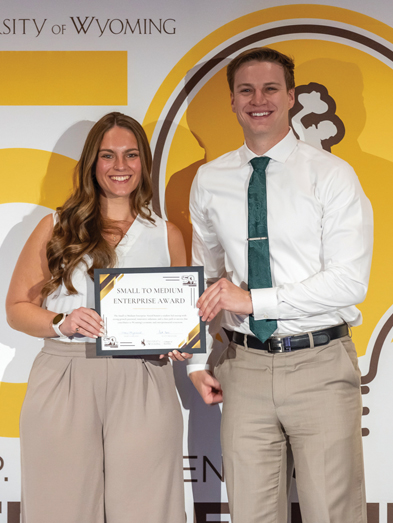
Sarah Drewry and Zachary Pinc (Photo by J.T. Cattelan)
Skála
Winner of the Small-Medium Enterprise Award, Skála created the Truck Bed Hammock System,
which is designed to transform truck beds into versatile comfortable spaces. With
a quick-install stake pocket design, the system maintains access to the truck bed
and hitch while providing a durable lightweight relaxation solution for camping, tailgating
and outdoor events.
“The idea for Skála came from a place of frustration,” says Zachary Pinc of Moline,
Ill., who entered the competition with fellow College of Business student Sarah Drewry
of Lander. “As someone who spends a lot of time outdoors, I was tired of how complicated
and limiting traditional outdoor gear could be, especially rooftop tents and bulky
setups that take over your truck bed. I wanted something simple and intuitive, something
that hooks up easily to the bed of your truck so you can start relaxing in nature
comfortably, simply and often.”
Over the next year, the company is focusing on growth and validation. It plans to
file for a provisional patent, to secure additional funding and to begin building
a marketing campaign to generate brand awareness. Once it gains traction, it plans
to begin scaling manufacturing and preparing for a broader product launch.
“The Ellbogen competition gave me access to incredible mentorship that I know will
continue to benefit me long after the competition,” Pinc says. “More importantly,
it taught me to chase my ideas and trust the entrepreneurial process. I found that
I genuinely love seeing an idea come to life, and having a platform to share it with
others was a powerful and validating experience.”
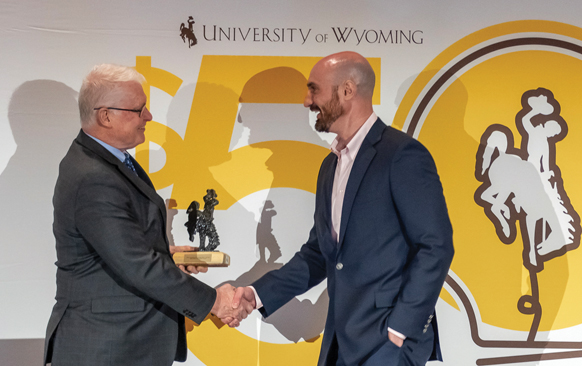
Corey Billington and Jacob Kirby (Photo by J.T. Cattelan)
RenU Fuel Solutions
College of Business student Jacob Kirby of San Marcos, Texas, teamed up with College
of Engineering and Physical Sciences student Anh Hoang Minh Nguyen of Vietnam to earn
the Benson Impact and Innovation Award for their concept, RenU Fuel Solutions.
RenU delivers nuclear fuel cycle and spent fuel supply chain solutions to U.S. government
agencies and commercial nuclear power providers. The company is committed to building
critical nuclear infrastructure in Wyoming, which will create high-quality stable
jobs in both the federal and commercial sectors.
The idea was born when a group of international nuclear scientists came to UW for
the 2024 Nuclear Innovation Bootcamp. “We had two weeks to solve some of the biggest
problems in the nuclear industry, and that is where the concept was born,” Kirby says.
“Our mission is to solve the problem of nuclear waste by turning it into a revenue-generating
asset. During the Ellbogen entrepreneurship competition, we received exceptional guidance
from our coach, Steve Hanlon, and insightful feedback from the entire coaching team.
The competition helped us transform our idea into a detailed business plan and provided
seed funding for our logo and early startup costs.”
They are now exploring partnerships with institutions to support their experimental
work. They also plan to pursue additional contests to generate funds and onboard high-caliber
talent.

